Quick Facts On Environmental Crimes
Property owners and local governments spend large amounts of money each year cleaning up wastes deposited by uncaring individuals. These monies easily reach into the millions of dollars and some of the money is your tax dollars. These individuals do not care that their waste pollutes our lands, water and air nor that future generations will be affected by their selfish acts.
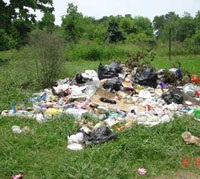 CRIMES
CRIMES
Unlawful Dumping - Health and Safety Code 365.012
-
A person commits an offense if the person disposes or permits the disposal of litter or other solid waste at a place that is not an approved solid waste site, including a place on or within 300 feet of a public right of way or highway, or on other public or private property, or into waters of the state.
-
A person commits an offense if the person receives litter or other solid waste for disposal at a place that is not an approved solid waste site, regardless of whether the litter or solid waste is disposed of on land the individual owns.
-
A person commits an offense if the person transports litter or solid waste to a place that is not an approved solid waste site.
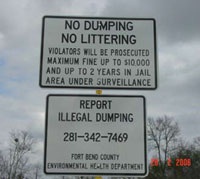 PENALTIES
PENALTIES
-
An offense under this section is a Class C Misdemeanor if the litter or solid waste for which the offense applies, weighs 5 pounds or less or has a volume of 5 gallons or less.
-
An offense under this section is a Class B Misdemeanor if the litter or solid waste for which the offense applies, weighs more that 5 pounds but less than 500 pounds, or has a volume of more than 5 gallons but less than 100 cubic feet.
-
An offense under this section is a Class A Misdemeanor if the litter or solid waste to which the offense applies weighs 500 pounds or more but less than 1000 pounds or has a volume of 100 cubic feet or more but less than 200 cubic feet.
-
An offense under this section is a Class A Misdemeanor if the litter or solid waste is disposed of for a commercial purpose (Economic Gain) and weighs more than 5 pounds but less than 200 pounds or has a volume of more than 5 gallons but less than 200 cubic feet.
-
An offense under this section is a State Jail Felony if the litter or solid waste to which the offense applies weighs 1000 pounds or more or has a volume of 200 cubic feet or more, or is disposed of for a Commercial Purpose and weighs 200 pounds or more or has a volume of 200 cubic feet.
A county ditch is not a permitted site for you to get rid of your garbage. If someone you hire hauls away trash or materials and then dumps them illegally, you may be held liable and charges filed against you.
The bottom line is solid waste has to be taken to a State permitted landfill.
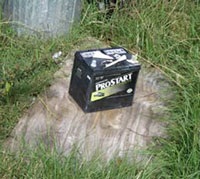 Lead Acid Batteries (Vehicle Batteries) - Texas Water Code 7.185
Lead Acid Batteries (Vehicle Batteries) - Texas Water Code 7.185
Dumping of any lead acid batteries such as batteries from automobiles, aircraft and power equipment is a criminal offense, punished by up to 1 year in jail and a $4000.00 fine.
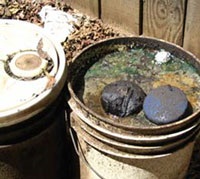 Used Motor Oil - Texas Water Code 7.176
Used Motor Oil - Texas Water Code 7.176
Dumping any amount of used motor oil onto the ground is a Felony offense, punishable by up to 2 years in a state jail and/or a $10,000.00 fine.
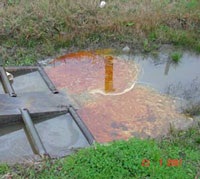 Dumping in Waters, Streams, Lakes or ponds - Texas Water Code 7.145/7.147
Dumping in Waters, Streams, Lakes or ponds - Texas Water Code 7.145/7.147
Illegal dumping of any waste material in waters of the state, streams, lakes, or ponds is a State Jail Felony, punishable by a $10,000.00 fine and/or up to 2 years in a state jail.
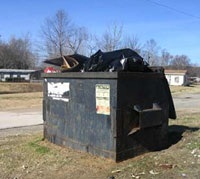 Unauthorized Use of Another Persons Dumpster - Penal Code 31.04 HSC 365.012
Unauthorized Use of Another Persons Dumpster - Penal Code 31.04 HSC 365.012
The unauthorized use of another persons dumpster, including the unauthorized use of a business dumpster is a crime. You may be punished under the Texas Penal Code for Class B Misdemeanor Theft or for Illegal Dumping. If the dumpster has not been rented by you, or you do not have permission of the owner/lessee, you are committing a crime when you use it.
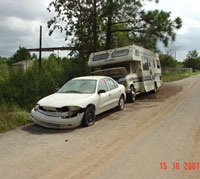 Junked Vehicles - Transportation Code 683.071
Junked Vehicles - Transportation Code 683.071
The definition of a Junked Vehicle is:
-
a vehicle that is self propelled and,
-
does not have lawfully attached
(a) an unexpired license plate
(b) a valid motor vehicle inspection is inoperable and has remained inoperable for more than
(1) 72 consecutive hours if the vehicle is on public property; or
(2) 30 consecutive days if the vehicle is on private property.
-
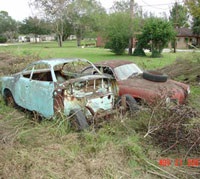 Junked Vehicles Declared to be a Public Nuisance
Junked Vehicles Declared to be a Public Nuisance
A junked vehicle, including a part of a junked vehicle, that is visible at any time of the year from a public place or public right-of-way:
Offense
(a) A person commits an offense if the person maintain a public nuisance as described in 683.072
(b) An offense under this section is a Class C Misdemeanor, punishable by a fine not exceeding $200.
(c) The court shall order abatement and removal of the Nuisance on conviction.
Failure to correct the public nuisance may result in the junked vehicle being removed and disposed of and transferred to a scrap yard or motor vehicle demolisher by the County.
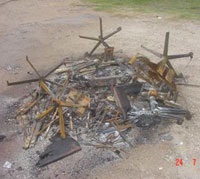 Unlawful Outdoor Burning
Unlawful Outdoor Burning
The burning of tires, PVC/plastics, treated lumber, non-wood construction debris, furniture, carpet, electrical wire, appliances, heavy oils, oil filters, asphalt materials, potentially explosive materials and chemical wastes is strictly prohibited and is a crime.
The burning of trash, brush, trees, stumps or other waste for commercial gain (Companies hired to remove waste from one site to another for disposal) is also a crime.
Only when collection of domestic waste is not provided or authorized by the local governmental entity, and when the waste is generated only from a property used exclusively as a private residence is burning allowed. On site private residential burning is approved for only domestic wastes generated only from that property (i.e., kitchen garbage, tree limbs, leaves etc).
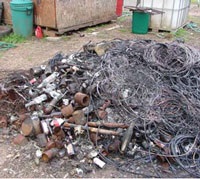 Waste not considered domestic waste and cannot be burned includes:
Waste not considered domestic waste and cannot be burned includes:
- Tires / Rubber
- Treated Lumber
- Non-Wood Construction Debris
- Furniture
- Carpet
- Electrical Wire
- Appliances
- Metal, Tin or Aluminum
- Oils / Oil Filters
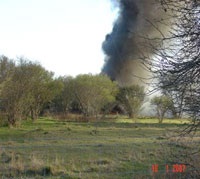
Land clearing operations must be done through Air Curtain Incineration (trench burning) or other alternate methods and must be authorized by the Texas Commission on Environmental Quality (TCEQ) contact the TCEQ Air Quality Section at: 713-767-3714 or 512-239-1250
